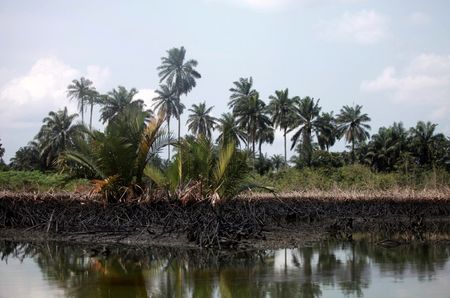By Libby George and Ulf Laessing
LONDON/LAGOS (Reuters) - Oil companies and even Nigerian officials are losing faith in a deal anytime soon with militants who have slashed the nation's oil output, casting doubt on a production recovery in what is typically Africa's largest oil exporter.
In the six months since the first major attack on Nigeria's oil – a sophisticated bombing of the subsea Forcados pipeline – dozens of attacks have pushed outages to more than 700,000 barrels per day (bpd), the highest in seven years.
Talk in the country has shifted from ceasefire optimism, and oil companies' assurances that repairs were underway, to hedged comments from the government and radio silence from oil majors.
"People are giving up in the short term," one oil industry source told Reuters of a resumption in exports of key Nigerian grades such as Forcados or Qua Iboe, adding that you "can't get anything" out of the majors, including Shell (LON:RDSa), Chevron (NYSE:CVX), ExxonMobil (NYSE:XOM) or ENI (MI:ENI), about when the oil might come back.
Shell declined to comment, while the other companies did not immediately responded to a request for comment.
In June, Nigerian government officials said privately it had a ceasefire with militants. But pessimism crept in, with even Oil Minister Emmanuel Ibe Kachikwu telling journalists this week "we are talking but (it) is not an easy thing," and "we need a ceasefire" – a contrast to the belief that a ceasefire was underway.
The problems reflect deep-seated issues in the Niger Delta, which produces the bulk of oil but whose local communities complain of pollution, a lack of opportunities and what they say is an insufficient share of petro dollars. These problems are compounded by an economic crisis and a government battle with Boko Haram militants in the north.
"This is likely the beginning," said Elizabeth Donnelly, deputy head and research fellow of London think-tank Chatham House's Africa Programme said of the unrest, adding that "the resolution that will come will not come quickly."
The government this month resumed cash payments to militant groups that it stopped in February, just before the launch of the worst violence since the payments began under a 2009 amnesty. But attacks continued anyway.
A group calling itself the Niger Delta Avengers claimed the bulk of them, announcing strikes on Twitter even before oil majors themselves knew their remote pipelines had been hit. Twitter shut the group's account, but sources said the Avengers have extensive knowledge of oil sites, and follow the media closely to track companies' actions.
"With the Avengers, you don't want to say 'we'll be back up next Wednesday', because then you'll get a bomb next Tuesday," one oil executive said. "They have to be careful."
But new groups, such as the self-styled "Revolution Alliance", which claimed an attack on a Shell-owned oil line, loom, while non-violent local protests have also exacted a toll.
Collings Edema, a local youth leader of the Itsekiri group that has blocked access to Chevron's Escravos tank farm for almost two weeks, said "the oil companies have not shown any sign that they are ready to improve our lives."
Experts warned that as long as people are unhappy, militants and their targets could evolve in unpredictable ways.
"This is also about frustrations of younger people coming up in the Niger Delta and needs not having been addressed," Donnelly said. "This isn't just about militancy, though the political and economic context feeds it."
Kachikwu told journalists this week that it was too early to say when Nigeria could increase output due to security concerns.
But the Avengers call the country a "failed state," while youth groups in the region remain deeply skeptical of the oil industry.

"From the situation on the ground I do not think the oil companies are ready to improve the lives of people of the Niger Delta region," said Eric Omare, spokesman for the Ijaw Youth Council, the youth body of biggest ethnic group in Delta. "The present structure of Nigeria does not encourage that."